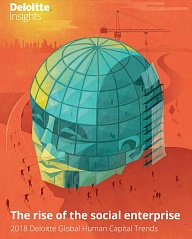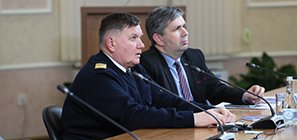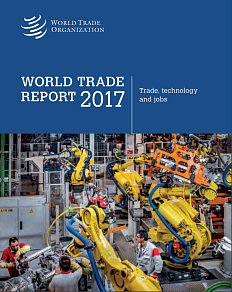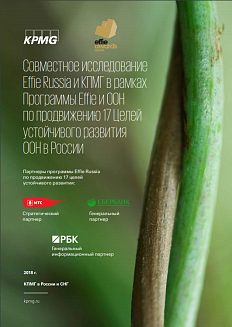The 2018 Deloitte Global Human Capital Trends report highlights the fact that growing concerns, such as automation, aging workforce, increasing demand for new skills, and labor shortage, present a challenge to business leaders. Each area of focus requires strong collaboration amongst top executives if they want to raise the social role of their companies. The report is based on a global survey of more than 11,000 business and HR leaders, as well as interviews with executives from some of todays leading organizations.
Among the many factors contributing to the rise of the «social enterprise», Deloitte experts see three powerful macroforces driving the urgency of this change. First, the power of the individual is growing, with millennials (people who were born from late 80s to early 90s when the era of globalization, industrialization, and digital transformation had already begun) coming to the forefront of business. Second, businesses are being expected to fill a widening leadership vacuum in society. Third, technological change is having unforeseen impacts on society even as it creates massive opportunities to achieve sustainable, inclusive growth.
To create an integrated view of the social enterprise, Deloitte experts identify and explore 10 human capital trends:
- THE SYMPHONIC C-SUITE: TEAMS LEADING TEAMS Behaving as a social enterprise demands cross-functional vision from C-suite leaders. Top executives must play together as a team while also leading their own functional teams.
- THE WORKFORCE ECOSYSTEM: MANAGING BEYOND THE ENTERPRISE Business leaders must manage relationships with workforce segments beyond the enterprise.
- NEW REWARDS: PERSONALIZED, AGILE, AND HOLISTIC Organizations must satisfy employees need for more personalized, agile, and holistic rewards.
- FROM CAREERS TO EXPERIENCES: NEW PATHWAYS Instead of a steady progression along a job-based pathway, leading organizations are shifting towards a model that empowers individuals to acquire valuable experiences and explore new roles.
- THE LONGEVITY DIVIDEND: WORK IN AN ERA OF 100-YEAR LIVES As the share of older employees in the workforce is growing, businesses are adapting to the situation by developing appropriate practices and policies.
- CITIZENSHIP AND SOCIAL IMPACT: SOCIETY HOLDS THE MIRROR An organizations track record of corporate citizenship and social impact now has a direct bearing on its core identity and strategy.
- WELL-BEING: A STRATEGY AND A RESPONSIBILITY Organizations must develop a wide range of programs for physical, mental, financial, and spiritual health of their employees.
- AI, ROBOTICS, AND AUTOMATION: PUT HUMANS IN THE LOOP Businesses must reconstruct work, retrain people, and rearrange the organization to confront the influx of AI, robotics, and automation into the workplace.
- THE HYPER-CONNECTED WORKPLACE: WILL PRODUCTIVITY REIGN? As communication tools migrate from personal life to workplace, interaction and collaboration between employees via work-based social media are growing stronger.
- PEOPLE DATA: HOW FAR IS TOO FAR? Corporate policies for data protection and personal data use are becoming a matter of paramount importance.
.png)
Deloitte experts emphasize that in our era human capital is inextricably tied to social capital. This reality demands a fundamental pivot in how organizations do business today and how they prepare for the human capital challenges of the future.
This publication has been posted in the Roscongress Information and Analytical System on the recommendation of the Roscongress Foundation expert community.






